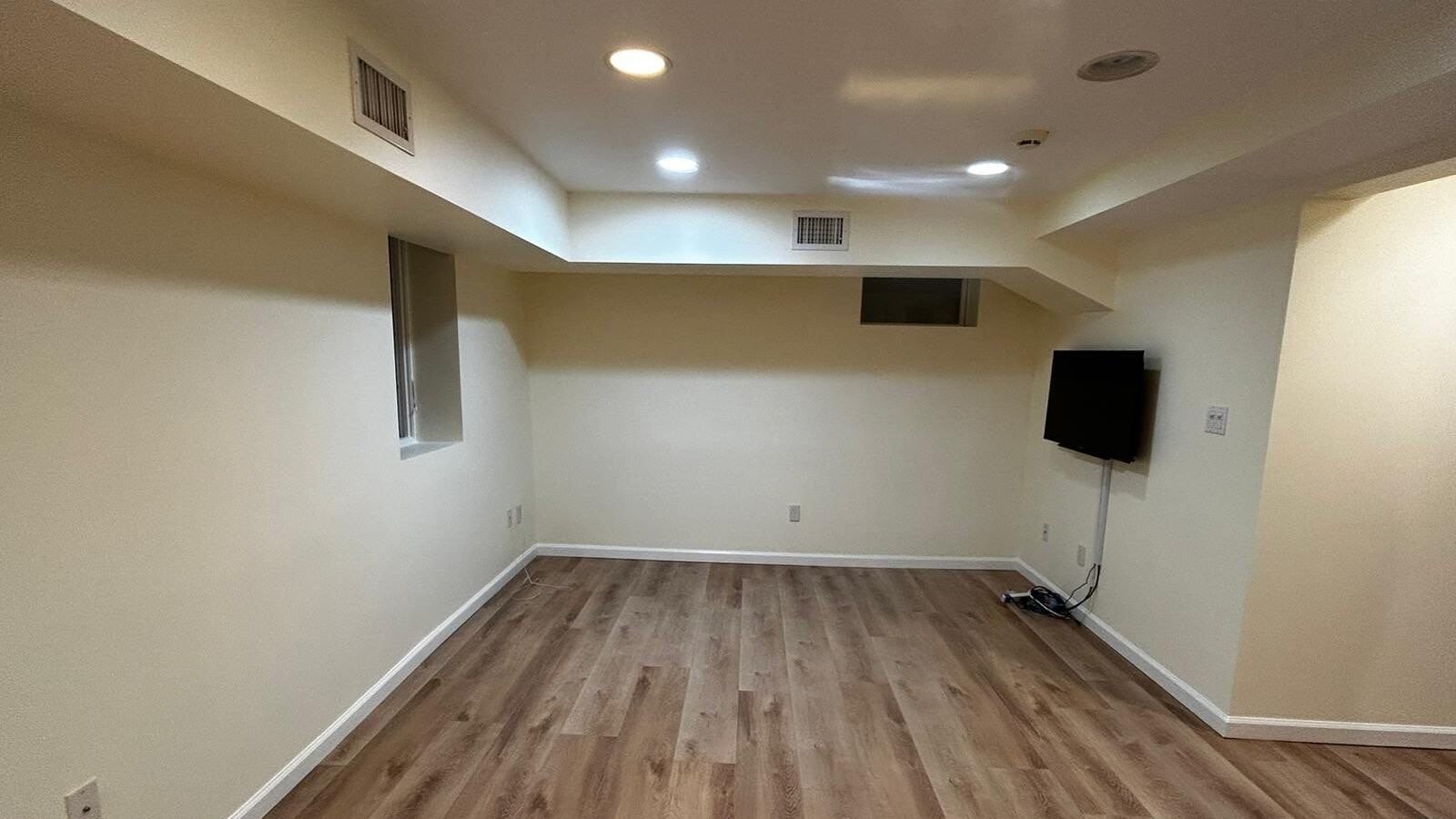Basements in Westchester county homes often serve multiple purposes – from storage areas and laundry rooms to fully finished living spaces, home gyms, or entertainment centers. But one thing many basements share is a unique environment: potentially higher humidity, less natural light, and concrete surfaces. Choosing the right paint finish is crucial for creating a durable, attractive, and comfortable basement space.
Whether you’re finishing your basement in Scarsdale or refreshing an existing one in rye, the paint you choose for the floors and walls needs to withstand the specific challenges basements present. Let’s explore the best options.

Paint for the basement floor
Basement floors, typically concrete, require specialized paint designed for durability, moisture resistance, and adhesion to concrete.
- Epoxy floor coatings: this is often the top recommendation for basement floors. Epoxy creates an extremely hard, durable, and seamless surface that resists moisture, stains, chemicals, and heavy foot traffic. It comes in various colors and can include decorative flakes for added visual appeal. While often more expensive and requiring careful surface preparation, its longevity makes it a worthwhile investment, especially for high-use basements.
- Concrete floor paint (Acrylic latex or oil-based): these are more traditional paint options specifically formulated for concrete. Acrylic latex versions are easier to apply and clean up, with lower VOCs. Oil-based options offer excellent durability but have stronger odors and longer drying times. Ensure you choose a paint specifically labeled for concrete floors, as regular wall paint will quickly peel or fail.
- Concrete stains: for a more natural look that allows the concrete’s texture to show through, stains are a great option. They penetrate the concrete rather than forming a surface film, making them very durable against peeling. Available in various colors, they can be sealed for added protection against moisture and stains.
Key considerations for basement floors:
- Moisture: test your concrete for moisture before painting. Excessive moisture vapor transmission can cause any coating to fail. A vapor barrier or specific primer might be needed.
- Preparation: proper cleaning and etching of the concrete is essential for good adhesion, regardless of the coating type.
Paint for the basement walls
When painting basement walls (whether drywall, concrete, or masonry), moisture resistance and light reflection are key considerations.
- Satin or eggshell finishes: these are generally the best choices for finished basement walls (like drywall). They offer good durability and washability compared to flat/matte finishes, which is important in potentially damp environments. Their slight sheen also helps reflect light, making the space feel brighter. Satin offers slightly better moisture resistance and cleanability than eggshell.
- Semi-gloss finish: while more durable and moisture-resistant, semi-gloss can highlight imperfections on walls, which might be more prevalent in basements. It’s a better choice for trim, doors, or potentially walls in a basement bathroom or laundry area.
- Waterproof or mold/mildew-resistant paints: consider paints specifically formulated with additives to resist moisture penetration and inhibit the growth of mold and mildew. These are excellent choices for basement walls, especially concrete or masonry surfaces, or in areas prone to dampness.
- Masonry/concrete wall paint: if painting directly onto concrete or cinder block walls, use a paint specifically designed for masonry. These paints are formulated to adhere well to porous surfaces and often have waterproofing properties.
- Avoid flat/matte finishes: while they hide imperfections well, flat paints are the least washable and least moisture-resistant, making them generally unsuitable for basement walls.
What color paint is best for a basement?
Basements often lack natural light, so color choice is critical for making the space feel bright, open, and inviting. While personal preference plays a role, some colors work particularly well:
Light neutrals
- Off-whites & creams: classic choices that maximize light reflection without feeling stark. Think shades like swiss coffee or alabaster. They provide a clean backdrop for any decor.
- Light grays: versatile and modern, light grays can feel sophisticated and airy. Choose warmer grays (greige) to avoid a cold feeling. Examples include agreeable gray or repose gray.
- Soft beiges: warmer than gray, soft beiges create a cozy yet bright atmosphere.
Light cool colors
- Pale blues: evoke a sense of spaciousness and calm. Light, airy blues can make a low ceiling feel higher.
- Soft greens: bring a touch of nature indoors and create a relaxing vibe. Sage green or mint green can work well.
Light warm colors
- Pale yellows: cheerful and bright, pale yellows can add warmth and energy without being overwhelming.
- Soft peaches or pinks: can create a cozy, inviting atmosphere, especially in entertainment or family room areas.
Strategic accent Walls
If you want bolder color, consider using it on a single accent wall, perhaps behind a TV or seating area. This adds personality without making the whole space feel dark.
Ceiling color
Painting the ceiling white (or a very light tint of the wall color) is almost always recommended in basements to maximize the feeling of height and light.
- Key color tip: use paint samples! test colors on different walls in your basement and observe them at various times of day under your basement’s specific lighting conditions before committing.
Basement painting service with Genesis Pro Painting
Painting a basement requires careful preparation and the right product choices to ensure a long-lasting, beautiful result. the unique conditions—potential moisture, concrete surfaces, and lighting challenges—mean expertise matters.
At Genesis Pro Painting, we have extensive experience painting basements throughout Westchester county. we can help you:
- Assess moisture levels and recommend appropriate preparation steps
- choose the best paint types and finishes for your specific basement surfaces (concrete floors, drywall, masonry)Select colors that will brighten your space and match your vision
- Properly prepare all surfaces for optimal adhesion and durability
- Apply coatings professionally for a flawless finish
Whether you’re creating a new living space or refreshing an existing one, trust Genesis Pro Painting to handle your basement painting project with skill and care. Contact us today for a consultation!






